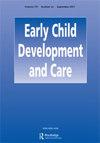The relationships between the COVID-19 fears of mothers and their mother-infant bonding and breastfeeding self-efficacy in the postpartum period*
IF 1
4区 心理学
Q3 EDUCATION & EDUCATIONAL RESEARCH
引用次数: 0
Abstract
ABSTRACTMothers who are in more sensitive and in a different state in the postpartum period may think that the COVID-19 pandemic will affect the health of their babies. This study was carried out to investigate the relationship between the COVID-19 fears of mothers in the postpartum period and their mother-infant bonding and breastfeeding self-efficacy levels. This descriptive study included 258 mothers who had given birth at a state hospital in Turkey. The data were collected an information form, the Fear of COVID-19 Scale, the Mother-to-Infant Bonding Scale, the Breastfeeding Self-Efficacy Scale and analyzed. It was found that the mothers had moderate COVID-19 fear levels, they did not experience mother-infant bonding problems, and their breastfeeding self-efficacy levels were high. There was a negative relationship between the COVID-19 fear scores and breastfeeding self-efficacy scores. It may be recommended to provide education programs the relationships between breastfeeding, mother-infant bonding, and COVID-19 on mothers.KEYWORDS: COVID-19mother-infant bondingbreastfeedingpostpartum period AcknowledgementsWe would like to thank the mothers who participated in this study.Disclosure statementNo potential conflict of interest was reported by the author(s).Authorship statementMP and İY designed the study. İY and MP were responsible for data management and data analysis. All authors drafted and revised the manuscript.Funding or sourcesThe authors did not receive any special funding for this study.Additional informationNotes on contributorsMerve PolatMerve Polat, is a nurse in Baby Monitoring And Follow-Up Center, Sivas Numune Hospital, Sivas, Turkey. She completed her master's degree in Sivas Cumhuriyet University, Institute of Health Sciences in 2022.İlknur Yildizİlknur Yıldız, is an assistant professor in Pediatric Nursing Department, Faculty of Health Sciences, Sivas Cumhuriyet University, Sivas, Turkey. Her research interests focus on infant, child and adolescent health.产后母亲新冠肺炎恐惧与母婴亲密和母乳喂养自我效能感的关系*
【摘要】产后敏感、状态不同的妈妈可能会认为新冠疫情会影响宝宝的健康。本研究旨在探讨产后母亲对新冠肺炎的恐惧与母婴亲密关系和母乳喂养自我效能感的关系。这项描述性研究包括258名在土耳其一家州立医院分娩的母亲。采用信息表、新冠病毒恐惧量表、母婴依恋量表、母乳喂养自我效能量表收集数据并进行分析。研究发现,这些母亲对COVID-19的恐惧程度中等,没有出现母婴关系问题,母乳喂养自我效能水平较高。新冠病毒恐惧得分与母乳喂养自我效能得分呈负相关。建议提供有关母乳喂养、母婴关系和COVID-19对母亲之间关系的教育项目。关键词:covid -19母婴亲密母乳喂养产后感谢我们要感谢参与本研究的母亲。披露声明作者未报告潜在的利益冲突。作者声明mp和İY设计了这项研究。İY和MP负责数据管理和数据分析。所有作者都起草并修改了手稿。资金或来源作者没有获得本研究的任何特殊资金。作者简介:merve Polat merve Polat是土耳其Sivas Numune医院婴儿监测和随访中心的一名护士。她于2022年在西瓦斯Cumhuriyet大学健康科学研究所完成硕士学位。İlknur Yildizİlknur Yıldız,是土耳其锡瓦斯Cumhuriyet大学健康科学学院儿科护理系助理教授。她的研究兴趣集中在婴儿、儿童和青少年健康。
本文章由计算机程序翻译,如有差异,请以英文原文为准。
求助全文
约1分钟内获得全文
求助全文

 求助内容:
求助内容: 应助结果提醒方式:
应助结果提醒方式:


